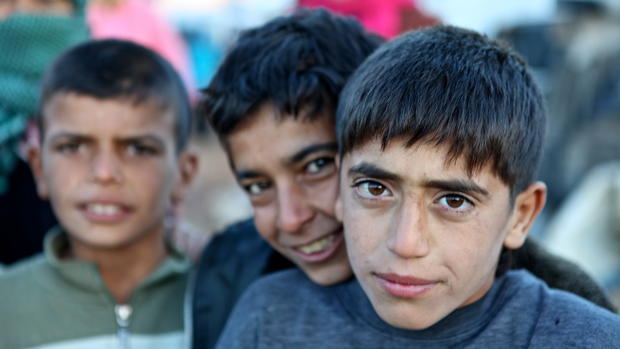Lebanon: "No capacity" for more Syrian refugees
BEIRUT -- Lebanon began limiting the flow of Syrians entering the country on Monday, placing unprecedented restrictions on their entry, as it struggles to cope with a flood of asylum seekers fleeing the civil war next door.
The response was yet another ripple effect of Syria's war that has displaced nearly half its pre-war population, sending over three million people fleeing into neighboring countries - primarily Lebanon, Turkey, Jordan and Iraq.
Lebanon is particularly vulnerable; for a tiny country of 4.5 million, the flood of Syrian refugees has placed a tremendous strain on its economy, resources, infrastructure and delicate sectarian balance.
Lebanese officials say they simply can't absorb more refugees. They estimate there are about 1.5 million Syrians in Lebanon, about one-quarter of the total population. Some 1.1 million of those are registered with the U.N.'s refugee agency, UNHCR.
"We have enough. There's no capacity anymore to host more displaced," said Interior Minister Nohad Machnouk in a press conference carried on local television.
The changes that went into effect Monday establish new categories of entry visas for Syrians - including tourism, business, education and medical care - and sharply limit the period of time they may stay in Lebanon. But the new restrictions, which were announced last week on Lebanon's General Security Directorate website, seemingly make no provisions for asylum seekers.
For decades, Syrians were freely given six-month visas and many simply crossed the porous border into the country, without any paperwork at all.
But after the outbreak of Syria's uprising four years ago collapsed into an entrenched civil war, hundreds of thousands poured into Lebanon, overwhelming the country's water and power supplies, pushing up rents and depressing the economy.
Tent cities have sprouted in rural areas - now muddy, miserable and freezing slums in winter. Public opinion has sharply turned against the Syrians, who many see as threatening the sovereignty of Lebanon - long-dominated by its larger neighbor.
The published restrictions came months after Lebanese border officials began informally restricting the entry to Syrians in October, which has already caused a 50-percent drop in people seeking to register with the U.N.'s refugee agency in Lebanon.
"We are looking at these new procedures with some interest, because those procedures don't make mention of the agreement of the government to continue to allow the most vulnerable cases to come through," said UNHCR's regional spokesman Ron Redmond.
The U.N. spokesman said even after informal limitations were introduced last year, the Lebanese government was still allowing in Syrians they deemed as "urgent cases" - single women fleeing with their children, those needing urgent medical care and children separated from their families.
"We didn't see any reference to that in these new regulations," Redmond said. "We want to get some kind of official documentation and description of how that's going to work."
A Lebanese security official, who spoke on condition of anonymity because he wasn't authorized to speak to press, said urgent humanitarian cases could still enter. He said the medical care category and a 48-hour visa to submit asylum applications to foreign embassies would allow coverage for asylum seekers to enter.
On Saturday, the Syrian Ambassador Ali Abdel-Karim called on Lebanon to "coordinate" its new measures with Damascus.
